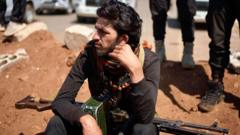In a shocking act of violence, a suicide bomber associated with Islamic State attacked the Greek Orthodox Church of the Prophet Elias, marking a significant return of extremist violence to the capital.
**Deadly Suicide Bombing in Damascus Church Claims 22 Lives**

**Deadly Suicide Bombing in Damascus Church Claims 22 Lives**
A tragic suicide bombing during a church service in Damascus has left at least 22 dead and numerous wounded.
At least 22 individuals were killed and over 63 others injured in a suicide bombing at the Greek Orthodox Church of the Prophet Elias in the Dweila neighborhood of Damascus, Syria, during Sunday evening services. According to the Syrian health ministry, the attack was carried out by a man who first opened fire inside the church before detonating an explosive vest. The Islamic State (IS) group is believed to be behind the attack, although no immediate claim of responsibility has been made by the group.
Devastating images from the church show severe damage, with a bloodied floor, broken glass strewn across the pews, and a destroyed altar. Eyewitness Lawrence Maamari recounted hearing gunfire and then the explosion, which he said sent wooden benches flying into the entrance. Witnesses reported panic and attempts to subdue the assailant prior to the explosion.
This incident marks the first such bombing in Damascus since the end of the civil war, which resulted in Islamist forces removing President Bashar al-Assad from power. The Greek Orthodox Patriarchate of Antioch condemned the attack, calling for the Syrian interim government to take responsibility for protecting places of worship and citizens.
In response, Interior Minister Anas Khattab declared that investigations into the "reprehensible crime" had begun, stating that such acts would not hinder the government's pursuit of civil peace. The UN special envoy for Syria, Geir Pedersen, also denounced the attack, urging a collective rejection of terrorism among Syrians.
The interim president, Ahmed al-Sharaa, who leads a Sunni Islamist group previously linked to al-Qaeda, has vowed to safeguard minority communities. Despite these assurances, IS has remained a threat in the region, targeting Christians and other religious minorities.
A report earlier this year indicated that IS could potentially exploit Syria's transitional phase to increase its violent activities, with estimates of thousands of fighters still operating in the country. The ongoing violence highlights the unresolved tensions and threats posed by extremist groups in Syria.






















